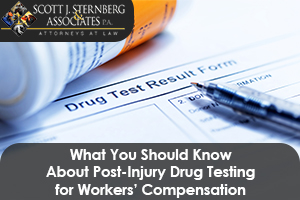It used to be standard practice to require a drug test after a workplace injury, a “blanket” procedure that was expected, regardless of how the injury took place. However, this changed in 2016 when the Occupational Safety and Health Administration (OSHA) released anti-retaliation provisions to their injury and illness tracking rules. Their new provisions were intended to make employees feel safe when reporting a work-related injury or illness, since many workers neglected to do so for fear of losing their job and their chance at workers’ compensation due to a positive drug screening.
There are three key things to keep in mind under the new OSHA rules. Employers are required to…
- Inform workers of their right to report work-related injuries without fear of retaliation
- Implement procedures to make reporting injuries and illnesses reasonable and does not deter workers from reporting (such as previous ‘blanket policies’ for drug testing)
- Incorporate the existing statutory prohibition on retaliating against workers for injuries and illness
These new regulations were put into place because the U.S. House of Representatives Committee on Education and Labor realized that “to intimidate workers, employers may require that workers are tested for drugs or alcohol [after every incident or injury], irrespective of any potential role of drug intoxication in the incident.”
When You’re Allowed to Drug Test Employees Post-Injury or Illness
If your policies used to include drug-testing after any on-the-job injury or related illness, know that you are not banned from drug testing – but you must follow certain protocol prior to doing so. OSHA now recommends that employers only use post-accident drug testing for situations where “employee drug use is likely to have contributed to the incident, and for which the drug test can accurately identify impairment caused by drug use.”
What this means, is that if you suspect your employee was intoxicated by alcohol or drugs when the accident occurred, and it may be able to help determine the cause of an injury that cannot otherwise be explained. However, an employer cannot use drug testing to threaten or detour employees from filing an injury report. Some states may automatically disqualify employees who are drug or alcohol users from receiving workers’ compensation and health benefits – so be up front about whether a drug test will be required or not, without scaring your employee out of filing the report.
Reviewing Your Drug Testing Policy to Ensure Compliance with OSHA
If you haven’t reviewed your drug testing policies since OSHA updated their regulations back in 2016, then you will want to do so as soon as possible. These regulations do not affect regular pre-employment drug screenings, or random drug screenings that are a mandatory part of employment – only your policies for after a work-related injury or illness.
Drug testing in the workplace is a sensitive subject – especially as laws change and evolve around the country. Always make sure that your Substance Abuse Policies, or Drug-Free Workplace Policy is up to date, accurate and complaint with all new laws and regulations. All policies that relate to post-accident drug testing should be reviewed so it cannot be interoperated as retaliatory, or discouraging to employees.
If you are looking for an attorney to review your current policies to ensure compliance, have questions about post-injury drug screenings, or are looking for help filing a workers’ compensation claim after filing an injury report, then reach out to Sternberg | Forsythe, P.A. for a free consultation.
Additional Reading:
Workplace Injury in A Grocery Store
Aggravation of Pre-Existing Conditions and Your Worker’s Compensation Benefits

